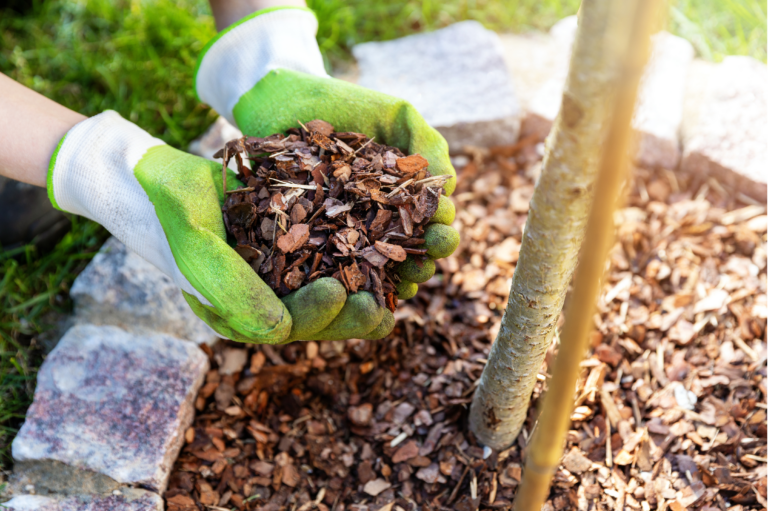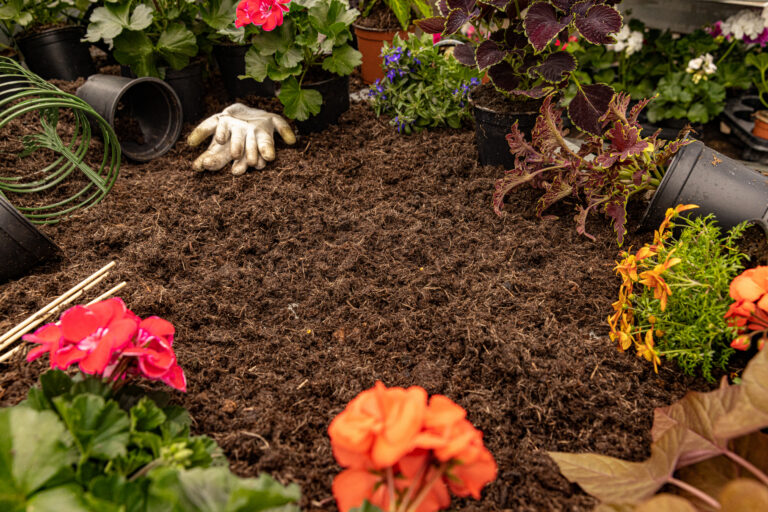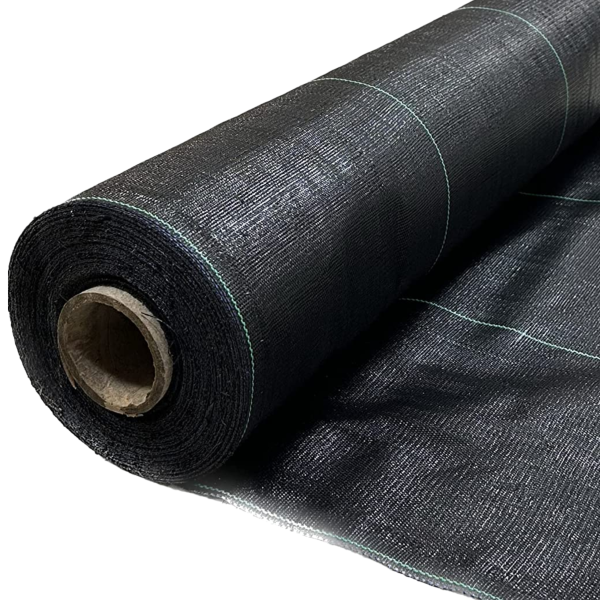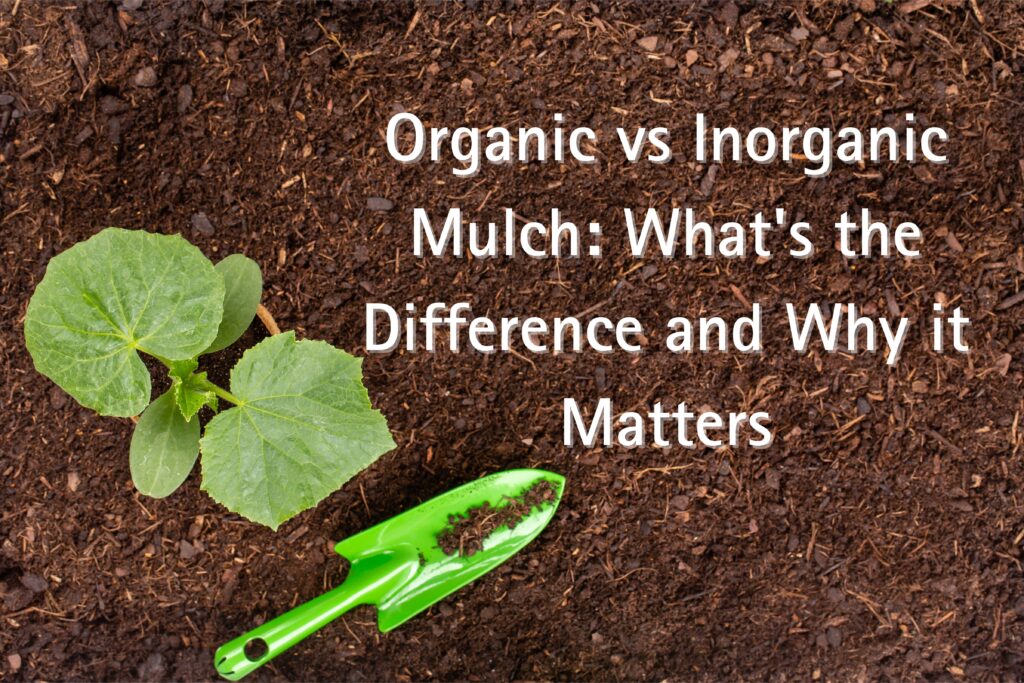Table of Contents
Mulching is a fundamental gardening practice that offers a range of benefits, from improving soil health to conserving moisture and suppressing weeds. However, not all mulches provide the same advantages. The primary distinction lies between organic and inorganic mulches, each with unique properties and implications for your garden. Understanding these differences is essential for making informed decisions that align with your gardening goals and environmental considerations. If you’d like to explore more about mulching installation, read our blog 7 Tips for Successful Mulch Installation.
Organic Mulch
Definition: Organic mulch is derived from natural, biodegradable materials. Common types include wood chips, bark, straw, grass clippings, leaves, compost, and pine needles.
Types of Organic Mulch:
1) Wood Chips and Bark:
- Usage: Commonly used in decorative landscapes, around trees, shrubs, and garden beds.
- Benefits: Decomposes slowly, providing long-term benefits and enhancing soil structure. Helps retain moisture and suppress weeds.
- Drawbacks: Needs replenishment every 1-2 years. Can attract termites and other pests.

2) Straw and Hay:
- Usage: Ideal for vegetable gardens, newly planted seeds, and as winter mulch.
- Benefits: Decomposes quickly, adding nutrients to the soil. Effective at preventing soil erosion.
- Drawbacks: Can contain weed seeds if not properly sourced. Breaks down quickly, requiring frequent replacement.
3) Grass Clippings:
- Usage: Useful for lawns and garden beds.
- Benefits: Decomposes rapidly, providing a quick source of nitrogen. Helps retain moisture and suppress weeds.
- Drawbacks: Can mat down, creating a barrier that prevents water and air penetration if applied too thickly.
4) Leaves:
- Usage: Suitable for garden beds, around trees, and shrubs.
- Benefits: Decomposes to enrich the soil with organic matter. Provides habitat for beneficial insects.
- Drawbacks: Can form a dense mat that inhibits water infiltration if not shredded.
5) Compost:
- Usage: Perfect for enriching soil in vegetable gardens, flower beds, and as a top dressing.
- Benefits: Provides a wide range of nutrients. Improves soil structure and water-holding capacity.
- Drawbacks: Requires time and effort to produce if homemade. Can be nutrient-rich, leading to potential over-fertilization.
6) Pine Needles:
- Usage: Good for acid-loving plants like azaleas, rhododendrons, and blueberries.
- Benefits: Decomposes slowly, adding organic matter over time. Helps maintain soil acidity.
- Drawbacks: Can acidify the soil, which may not be suitable for all plants. Can be difficult to spread evenly.
Advantages of Organic Mulch:
- Soil Improvement: As organic mulch decomposes, it adds nutrients to the soil, improving its fertility and structure. This promotes healthy root growth and plant development.
- Moisture Retention: Organic mulch helps retain soil moisture by reducing evaporation, which is especially beneficial during dry periods.
- Weed Suppression: A thick layer of organic mulch can prevent weed seeds from germinating, reducing the need for chemical herbicides.
- Temperature Regulation: It helps maintain consistent soil temperatures, protecting plant roots from extreme heat and cold.
- Eco-Friendly: Organic mulches are sustainable and environmentally friendly, as they decompose and return to the soil.

Disadvantages of Organic Mulch:
- Frequent Replacement: Organic mulch breaks down over time, requiring periodic replenishment.
- Pest Attraction: Some types of organic mulch, like wood chips, can attract pests such as termites or rodents.
Where to Use Organic Mulch:
- Garden Beds: Enhances soil and provides nutrients to plants.
- Around Trees and Shrubs: Helps maintain moisture and regulate temperature.
- Vegetable Gardens: Improves soil fertility and structure.
Inorganic Mulch
Definition: Inorganic mulch is made from non-biodegradable materials, including gravel, stones, plastic sheeting, landscape fabric, and rubber mulch.
Types of Inorganic Mulch:
1) Gravel and Stones:
- Usage: Common in decorative landscapes, around plants that prefer dry conditions, and in high-traffic areas.
- Benefits: Does not decompose, providing long-term coverage. Helps prevent soil erosion and provides good drainage.
- Drawbacks: Can retain heat, potentially harming plant roots in hot climates. Does not add nutrients to the soil.
2) Plastic Sheeting:
- Usage: Effective for weed control in vegetable gardens and flower beds.
- Benefits: Highly effective at suppressing weeds. Retains soil moisture.
- Drawbacks: Can create an impermeable barrier, preventing water and air from reaching plant roots. Not eco-friendly.
3) Landscape Fabric:
- Usage: Often used under other types of mulch to prevent weeds. If you’d like to explore more about landscape fabric, read our blog Laying Weed Barrier Underneath Mulch: Pros and Cons
- Benefits: Allows water and air to pass through while blocking weeds. Long-lasting.
- Drawbacks: Can be expensive. Does not add nutrients to the soil and can be difficult to remove.

4) Rubber Mulch:
- Usage: Made from recycled tires, used in playgrounds and decorative gardens.
- Benefits: Very durable, does not decompose, and provides excellent weed suppression. Cushions impact in playgrounds.
- Drawbacks: Can retain heat, potentially harming plant roots. Not biodegradable and can release harmful chemicals over time.
Advantages of Inorganic Mulch:
- Longevity: Inorganic mulch does not decompose, so it lasts longer and does not need frequent replacement.
- Weed Control: Landscape fabric and plastic sheeting are highly effective at suppressing weeds.
- Low Maintenance: Inorganic mulch requires less maintenance over time compared to organic options.
- Aesthetic Appeal: Materials like stones and gravel can enhance the visual appeal of a landscape with their clean, modern look.
Disadvantages of Inorganic Mulch:
- Soil Health: Inorganic mulch does not add nutrients to the soil, potentially leading to poorer soil health over time.
- Heat Retention: Some inorganic mulches, particularly black plastic and rubber, can retain heat, potentially harming plant roots in hot climates.
- Environmental Impact: Inorganic mulches, especially plastics, are not environmentally friendly and can contribute to pollution.
Where to Use Inorganic Mulch:
- Decorative Landscapes: Enhances visual appeal with minimal maintenance.
- Playgrounds: Provides a durable and safe surface.
- Walkways and Paths: Keeps weeds down and offers a clean look.
- Areas with Poor Soil: Where adding nutrients is not a priority.
Why It Matters
Choosing the right type of mulch for your garden depends on your specific needs and environmental considerations.
- For Soil Health: Organic mulch is the better choice if you aim to improve soil fertility and support a healthy ecosystem.
- For Longevity and Maintenance: Inorganic mulch is ideal if you prefer a low-maintenance option that doesn’t require frequent replacement.
- For Weed Control: Both types can be effective, but inorganic options like landscape fabric and plastic are often more reliable for long-term weed suppression.
- For Sustainability: Organic mulch is generally more sustainable and eco-friendly, contributing to a healthier environment.
Conclusion
In conclusion, the choice between organic and inorganic mulch is a crucial one for gardeners looking to optimize their efforts and maintain a healthy, sustainable garden. While organic mulches provide the added benefits of enriching the soil and supporting a thriving ecosystem, inorganic mulches offer longevity and low maintenance. By understanding the unique properties and implications of each type, you can select the mulch that best suits your gardening needs and environmental values. Whether aiming for soil enrichment or long-term weed control, the right mulch can significantly enhance the health and appearance of your garden. For more detailed information and tailored advice, visit our page on mulching. For support on your next mulch project, please feel free to reach out through our contact form, and our team will be happy to help.



